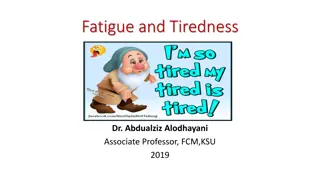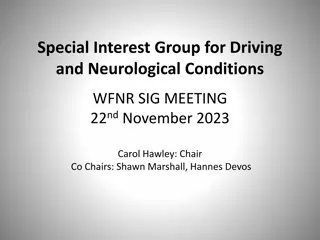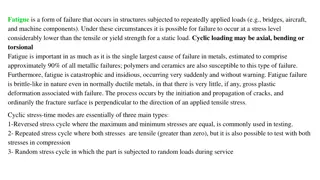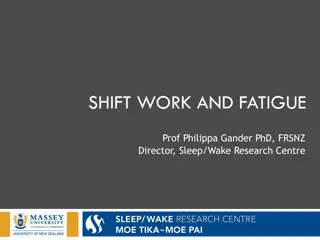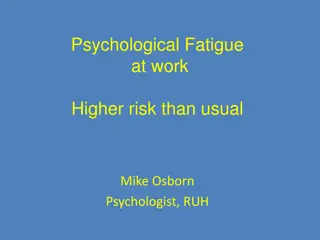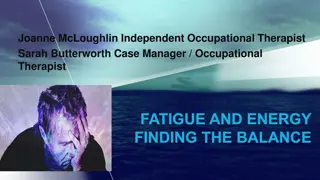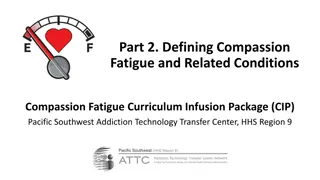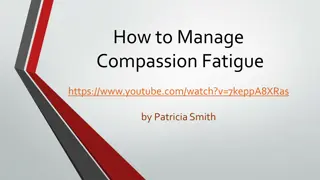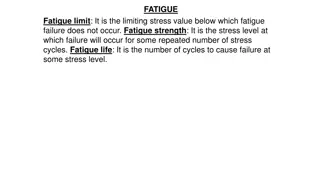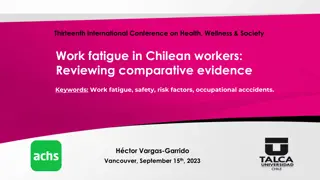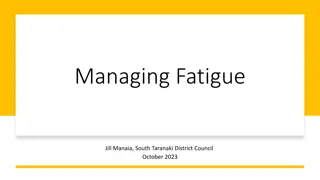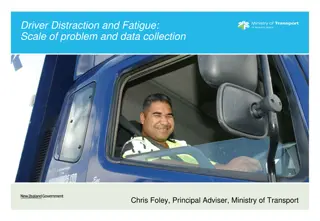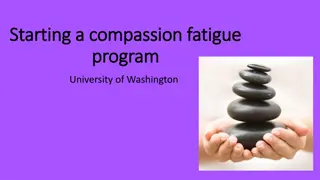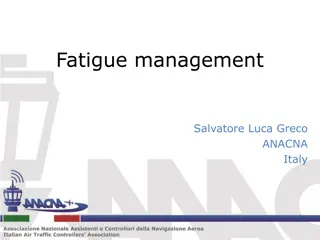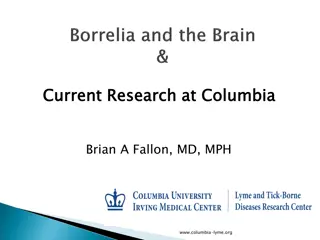Practical Techniques for Managing Fatigue in Clients with Neurological Conditions
This session by Dr. Nina McLoughlin, a Senior Clinical Psychologist/Neuropsychologist, focuses on practical fatigue management techniques for clients with brain injuries, strokes, and other neurological conditions. Emphasizing the importance of addressing sleep as the primary intervention point, the session highlights the impact of fatigue on various aspects of life and discusses a case study illustrating the effects of fatigue on a stroke patient. The session also emphasizes the need for building a therapeutic alliance with clients to effectively manage fatigue.
- Fatigue Management
- Neurological Conditions
- Sleep Intervention
- Therapeutic Alliance
- Clinical Psychology
Download Presentation

Please find below an Image/Link to download the presentation.
The content on the website is provided AS IS for your information and personal use only. It may not be sold, licensed, or shared on other websites without obtaining consent from the author. Download presentation by click this link. If you encounter any issues during the download, it is possible that the publisher has removed the file from their server.
E N D
Presentation Transcript
Dr Nina McLoughlin Fatigue management Senior Clinical Psychologist / Neuropsychologist Burwood Brain Injury Rehabilitation Service (BIRS, Ward CG) Burwood Hospital
Overview This session is based on practical techniques that I use with my clients everyday Used in an inpatient and outpatient setting with clients with brain injury Stroke TBI Degenerative neurological conditions Other Neurological conditions (e.g. meningitis)
Before we start Personal opinion sleep should be the first intervention point Poor sleep will impact on day time fatigue Improved sleep will have a positive effect on a range of factors Cognitive abilities Mood Motivation Day time energy levels .
Impact of fatigue The vast majority of stroke patients will experience some level of fatigue Fatigue is linked with mental health and engagement in rehabilitation Fatigue is on a continuum of experience
The impact of fatigue Client A: Right Middle Cerebral Artery (MCA) Stroke Inpatient and then community follow up Professional position that he was keen to return to Lack of insight into difficulties Showing him his reproduction of a design at the end of testing Not taking his 1 hour rests Focuses on increasing hours Getting back into running to pass a fitness tests (which was optional) A close family member passed away and took on full responsibility of managing their estate
Neuropsychological re-assessment Scores significantly poorer than last session Looked fatigued Experienced physical symptoms: Cramp muscle spasm reduced functioning down left side mild confusion Admitted to ED CT imaging and EEG
Diagnosis Significant fatigue
Preparing the client Fatigue management is not easy but can be achieved It takes time Its about management not a cure Take time to build up a therapeutic alliance Without this you have nothing Everyone is different so the client needs to: Agree that there is a problem Explore their own fatigue threshold in and out of therapy Understand what activities fatigue them and the ones that don t
Fatigue is a perception It is not just about energy in and out How we view an activity is also important
Advice to patients Any change in life circumstances requires adjustment Leaving hospital Starting / increasing work hours A new child Moving home You may feel that you have taken a step backward. This is normal. Slowly over time you will adjust. You can take the long slow road pacing/management Or the quick road that feels easier life as normal which leads to boom and bust In the end you will hopefully get to the same place but the journey will be harder with boom and bust
Factors which maintain fatigue Having too much rest during the day Anxiety about resting during the day (e.g. I must get to sleep) Rigid focus on anxiety reduction techniques (e.g. at 1pm I need to rest) Using caffeine, energy drinks, and nicotine to delay fatigue Not doing enough activity Keeping to the same plan i.e. the same amount of activity throughout recovery
Factors we may not be able to change Side effects of medication But you can always ask for a medication review The living circumstances of the patient E.g. very busy household
Other impacts Other issues can impact on fatigue Pain Mood Life stressors Other medical issues We need to get the whole picture
Measuring fatigue The fatigue severity scale (FSS) Behavioural consequences of fatigue Impact of fatigue on daily functioning 9 items Visual analogue scale for fatigue (VAS-F) Respond to 12 items on 2 scales Energy scale not at all active to extremely active Fatigue scale Not at all worn out to extremely worn out
Measuring fatigue Causes of fatigue questionnaire (COF) 12 activities, rate how fatiguing on a 5 point scale Mental and physical effort Epworth Sleepiness Study 8 questions Rating the likelihood of falling sleep whilst engaging in activities
Gathering information from other sources is important especially with clients with poor insight Video evidence (with permission) can be useful in showing them the effects of fatigue Looking in the mirror (literally)
Defining fatigue There are multiple aspects to fatigue The end product is tiredness We need to understand why our clients get tired
Emotional fatigue Our mental well being has an impact on our energy levels Improving mood = increased energy Brain injury can impact on our management of emotions Anxiety reduction techniques Thought challenging / restructuring Worry dairy Breathing Gradual increase in pleasurable activity Weekly planner
Physical fatigue Brain injury can bring about physical changes which make everyday tasks more demanding When planning the week consider the impact of physical fatigue E.g. a client in a wheelchair completing domestic tasks before going out to lunch with friends
Cognitive fatigue Brain injury can cause cognitive changes What are the clients cognitive difficulties? These changes impact on how you tailor your therapy as well as increasing energy demands when engaged in cognitive tasks E.g. memory difficulties = repeat information over a number of sessions
Matching Physical, emotional, and cognitive are interlinked BUT remember a highly cognitively demanding task will have more impact on someone with cognitive difficulties Consider the clients difficulties when planning activities for the week Create their own tailored plan High energy tasks Low energy tasks
Strategies Fatigue management Psycho-education about the signs of fatigue The boom and bust cycle Challenge unhelpful attitudes just need to push through it Learning their own signs and triggers Planning and pacing Rest before big activities What are their personal triggers to fatigue Micro-breaks during big activities Checking in on how you feel
The basket technique Life does not go on hold for our clients whilst they get their heads around fatigue management This basic approach is a simple way of managing the chaos With the client write down all of the things that they need to do
The basket technique Basket A Basket B Basket C I need to do today I can leave this for a few days I can leave this for a few weeks or month Go into work as see my manager Get the food shopping Book a GP appointment for a review Pick up medication
Delegation This is about reserving energy for the things the client really wants to do Management is about giving other people responsibility High achieving clients find this difficult Re-framing: they have the control of delegation It is about them giving tasks out, not having them taken from away
Pacing fun activities This means extending the normal daily or weekly plan Planning for special events E.g. Christmas Setting an achievable goal and making a plan Have a rest before I go for 1 hour Arrive at 7pm Stay for 2 hours Have a micro-break after 1 hour Stick to the plan If a client experiences a bust at the end of a pleasurable activity this is what they are likely to remember Leave on a high More likely to do it again Get used to the benefits of following a plan Improves mood and sense of achievement
Client B Left sided carotid artery dissection resulting in stroke Wanted to go to social events Barriers Fatigue Noise sensitivity Word finding difficulties Developed a plan Will attend for 4 hours No alcohol Microbreaks every 30 mins (mobile phone reminder) Go home early if feel fatigued Leave on a high
What happened? Drank alcohol Ignored mobile phone reminders Partner felt like a nag Became overstimulated Had an argument on the way home The main thing they remembered from the night was the argument
Back to the plan Identified another social event What did we learn from the last one? Learning experience from the first outing made the next trip more successful Left on a high
Let clients make mistakes Family avoid being the nag (therapists too) Boom and bust is how some clients learn Avoid saying I told you so Instead so what have you learned? Learning can take a long time Learning is confounded by the stages of adjustment (i.e. denial, hopelessness etc) Fatigue is not a thing that can be battled Some clients need time to learn that
Active relaxing For people who find it hard to relax or rest during the day consider low energy tasks Some clients find resting too boring or may use the time to ruminate Rests need to be tailored to the client Consider their strengths and weaknesses E.g. a client with receptive language difficulties will not find reading relaxing These can be sometimes more effective than trying to get a client to just rest
Flexibility Brain injury recovery goes on for years therefore clients need to know that they should continue to test boundaries after therapy has ended Life changes and so fatigue management needs to change with it



